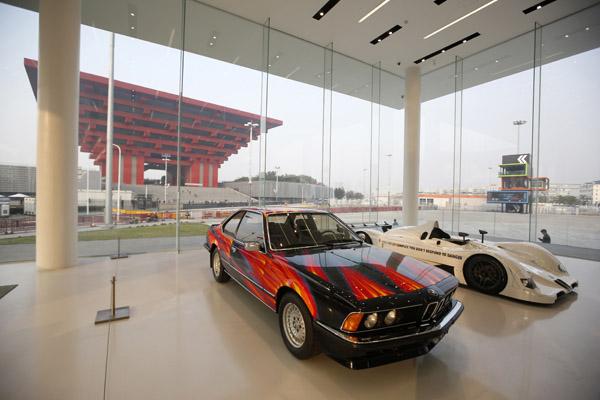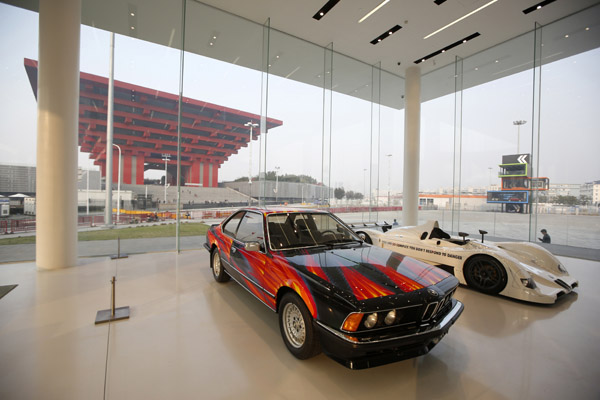
On China's roads, luxury risks becoming ordinary, say Samuel Shen and Norihiko Shirouzu of Reuters
Luxury car dealers are resorting to offering customers massages, mini-golf and other gimmicks, hoping this will give them an edge in a ferociously competitive Chinese market where brand loyalty is less common than in the West.
Premium car sales slowed in China last year as the economy eased off the throttle and new Communist Party leadership was installed, but momentum is returning, and China is set to overtake the United States as the world's top luxury car market by 2020 with annual sales of close to three million cars.
A victim of its own recent success, the Chinese market has become a hypercompetitive battleground. Five years ago, there were fewer than a dozen luxury car models sold under five premium brands. Today, that has exploded to more than 90 models offered by 25 brands, says market research firm TNS.
China last year displaced the United States as BMW's leading market, and the German premium brand sold 317,822 vehicles in January-October of this year, a fifth more than a year earlier. Porsche increased its Greater China sales last year by 28 percent to 31,205 vehicles, closing in on its sales in its biggest market, the United States.
Liu Zheng, a 54-year-old history professor in Shanghai and owner of a BMW 5-Series sedan, sums up the problem facing premium carmakers such as BMW, Mercedes-Benz and Volvo.
"On Chinese roads, there are too many BMWs, too many Mercedes, too many Audis," he says as Liu looks around a downtown Shanghai store for a new China premium brand called Red Flag, made by state-owned FAW Car Co Ltd. "There are very few Red Flag cars. If you own one, people would feel you're unique."
As Western premium brands have become almost commonplace on Chinese city streets, moneyed locals have scaled further up to Aston Martin, Porsche, Jaguar and even McLaren, Ferrari and Lamborghini to stand out from the crowd. Ford is launching its storied Lincoln brand in China next year, adding to a competitive field that also includes the likes of Infiniti and Tesla.
Audi opened its Innovation Exhibition at the Guangzhou auto show last month, showcasing its technologies and concept cars such as the Crosslane Coupé, as well as the new generation Audi 3, including the plug-in hybrid A3 Sportback e-tron.
"China is the market with the highest competition. There's no other market that offers more brands," says Boris Weletzky, a Beijing-based BMW sales and marketing executive tasked with leading the German firm's charm offensive to give its brand more cachet, and stop drivers like Professor Liu from defecting.
Little loyalty
A majority of car buyers in China, including those splurging on top-of-the-range premium models, are first-time buyers and have little loyalty to any global brand.
In an attempt to sway Chinese hearts and minds, Mercedes-Benz plans to build a brand museum in Beijing, a move that Volvo is also considering. Ford recently sponsored a classic car exhibition on Shanghai's Bund with its historic Lincoln models, while General Motors plans to allow some potential buyers inside its Cadillac plant in Shanghai to see their cars being assembled, according to Bob Socia, president of GM China.
Dealers at BMW and Mercedes-Benz outlets offer select buyers pomp and ceremony at the clinching of a deal - including ribbon cutting, hand shaking, photo taking and a banquet. Some Land Rover Jaguar showrooms provide massage services and video rooms, and its newly opened Shanghai store comes complete with a mini-golf site.
BMW this year opened a store on the former Expo grounds in Shanghai that doesn't aim to sell a single car.
Instead, the German firm's Future Retail Brand Experience Centre “sells” the BMW story through historic model displays, photos and film. The aim is to hype the brand's heritage in a modern, art gallery type environment.
"BMW was an admirable brand, but now people in China see BMW, Mercedes and Audi as mass luxury brands," says John Shen, senior partner at consultancy Roland Burger. "BMW and others are trying to revitalise their brands, to create more emotional values, more unique experiences at the retail level."
BMW's levers for differentiation, being tapped as part of the Future Retail initiative launched in 2011 in Britain, the Netherlands, France and China, are two-fold: Driving the brand-enhancing effort, as in the Shanghai experience centre, and a new, non-pressure sales environment it is creating throughout its 200 retail outlets across China.
The company will deploy a so-called Product Genius - who is not a salesperson and isn't there to quote prices or push deals - at each BMW dealer in China. Interested customers are encouraged to drop in and browse - much as they might at a Prada or Gucci boutique - and they are given the kind of attentive service a visitor might expect from Four Seasons and Ritz Carlton hotels, Weletzky says.
Potential buyers will be able to configure their virtual dream BMW car on an iPad with a Genius, and then watch the result projected on a giant screen through 3D glasses.
Follow us on Twitter: @ALB_Magazine.



